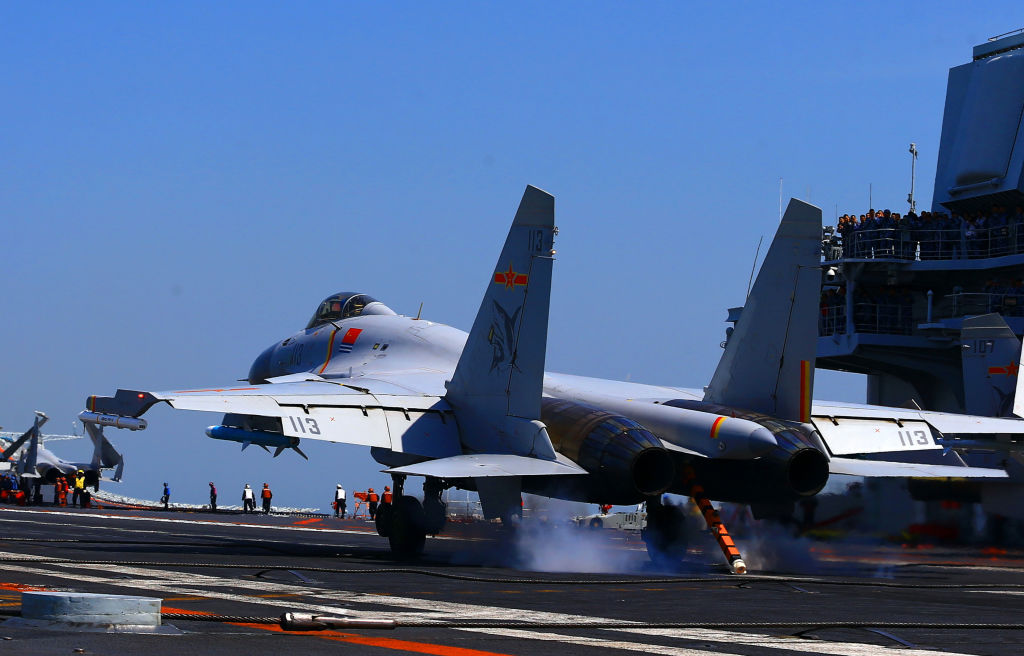
As the 100th anniversary of the founding of the Chinese Communist Party approaches, the world is watching closely to see what China does as it tries to realise President Xi Jinping’s ‘China dream’ and achieve ‘national rejuvenation’. Ultimately, Xi seeks to position the People’s Republic of China as the leader of a new international order that reflects Beijing’s core aims.
In their new ASPI report,
To deter the PRC ..., Kyle Marcrum and Brendan S. Mulvaney note that the Chinese government is attempting to ‘redefine’ the international order to correlate with its national interests. China is challenging the global status quo and using coercion and ‘wolf warrior’ diplomacy in an effort to shape the international order to its liking.
The report refers to an authoritative People’s Liberation Army
publication, the 2013
Science of military strategy, which outlines Chinese conceptions of deterrence. Marcrum and Mulvaney argue that China’s definition of ‘deterrence’ looks a lot like what Westerners would call ‘coercion’, prompting speculation about the actions China may take to realise Xi’s ‘China dream’—a dream that includes the unification of Taiwan and the PRC.
The report’s insights point to a particular challenge facing Western liberal democracies in considering the prospect of a major military crisis over Taiwan or in the South China Sea in coming years. If deterrence in a traditional sense is the use of a declared or implied threat to prevent an action inimical to the interests of the deterring power, a Chinese approach that is more coercive—forcing an opponent to act according to the interests of the coercing state—would be seen from the West as aggression. There’s a risk that failures in Beijing and Washington to understand each other’s motives and ‘strategic cultures’ could cause the rapid escalation of any future crisis over Taiwan, leading to war by miscalculation.
In recent months, China has engaged in aggressive naval
patrols around Taiwan and has regularly sent flights of warplanes into Taiwan’s air defence identification zone. The most recent
incident involved a record 28 military aircraft earlier this month. Such flights can certainly be interpreted as a form of coercion, to pressure the government in Taipei to accept China’s demands for unification on Beijing’s terms. They would also be driven by a desire to deter Taiwan from formally declaring independence. In addition, every flight generates useful intelligence for the PLA on Taiwanese military capabilities and at the same time adds pressure on Taiwan’s forces that over time could wear down their readiness through attrition.
There’s now understandable concern that following the 100th anniversary celebrations on 1 July, China will ramp up pressure on Taiwan, particularly in grey-zone operations—a coordinated series of actions below the level that would generate a US military response but that would increase pressure on Taipei to bend to Beijing’s demands for unification. At the same time, it’s likely that China will intensify its efforts to isolate Taiwan diplomatically to accentuate its vulnerability to coercive pressure. Beijing could also attempt to increase pressure against a move towards greater independence in the lead-up to Taiwan’s 2024 presidential election and against any form of external intervention to assist the island.
Taiwan’s profile has been enhanced by its successful response to the Covid-19 pandemic. The rally-round-the-flag effect has
helped the ruling Democratic Progressive Party (DPP) gain support. Other countries, especially the US and its allies, have not only recognised Taiwan’s importance in international engagements both economically and diplomatically, but also become more willing to
support Taiwan in public,
despite China’s inevitable denouncements.
While it seems the DPP has been able to
counter Chinese influence and will thus be able to challenge the opposition Koumintang in the 2022 local and 2024 presidential elections,
domestic disputes and the unexpected recent outbreak of Covid-19 have once again exposed the island to the danger of Chinese coercion. China’s recent
interference on access to Covid-19 vaccines has jeopardised the confidence many Taiwanese had in the DPP.
Even so, Taiwan is unlikely to bend to Chinese efforts in the grey zone, and of key importance is how relations evolve with the US under President Joe Biden. China currently lacks the military ability to invade and occupy Taiwan but is rapidly developing the means to do so. A recent
workshop held by the US-based China Maritime Studies Institute considered the PLA’s ability—or lack thereof—in the large-scale amphibious warfare necessary to undertake an invasion of Taiwan. In particular, the workshop found that the PLA’s lack of adequate logistics and amphibious lift are key problems, noting China seems to be planning to rely heavily on elements such as its maritime militia. There are also gaps in China’s ability to conduct effective joint operations that could frustrate any island landing campaign, particularly given Taiwan’s potential to develop its own anti-access/area-denial (A2/AD) capabilities.
Will Beijing move to address these gaps in coming years? China will probably prioritise establishing an effective A2/AD capability to deter or counter US intervention in a cross-strait crisis before it addresses shortfalls in amphibious and logistics capability. How quickly China can address these shortfalls as it also conducts grey-zone operations and builds more powerful A2/AD capabilities in coming years is a key question.
 Print This Post
Print This Post